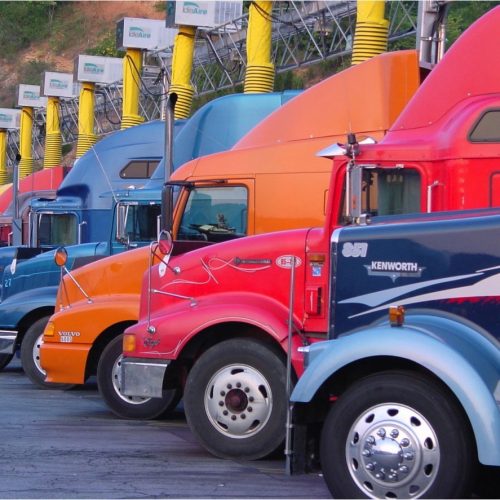Mark Grundy
Managing Director of Global Marketing & Communications

Run on Less proves available techs could unlock $24 billion for N.A. trucking
September 24, 2017, Atlanta
Run on Less, a first of its kind cross-country road show, has proven that 10 mpg is possible using efficiency technologies that are available on the market today. If the 1.7 million trucks on North American highways today achieved the same level of efficiency as the trucks in the Run, they would save 9.7 billion gallons of diesel fuel, $24.3 billion and 98 million tons of CO2each year. The results exceeded the original 9 mpg goal set by hosts Carbon War Room (CWR) and the North American Council for Freight Efficiency (NACFE). Shell and PepsiCo were the title sponsors.
The seven participating trucks drove a combined 50,107 miles during the seventeen day event which kicked off on September 6. They achieved a cumulative average of 10.1 mpg during 99 days of driving. The trucks—from fleets Albert Transport, PepsiCo’s Frito-Lay Division, Hirschbach, Mesilla Valley Transportation, Nussbaum Transportation, Ploger Transportation, and US Xpress—saved 2,877 gallons of fuel and $7,193 against the national average of 6.4 mpg. Of the 99 days, the highest mpg achieved was 12.8, and three different trucks had days over 12.5 mpg. The lowest mpg from a truck was 7.1 on one of the days, and the average for all lowest mpgs throughout the Run was 8.8.
The average gross combination weight over the Run was 55,498 pounds, with 31 of the 99 days over 65,000 pounds. Wind was monitored along each truck’s route using OpenWeatherMap.org and it varied from a 6.8 mph average headwind to a 7.6 tailwind. All truckers dealt with hurricanes Harvey or Irma. Average vehicle speed was 54 mph and elevation gain was tracked for each route. One day, a truck travelled 3,270 ft. of elevation gain with 72,960 gross combination weight and experienced an average 2.7 mph headwind and still achieved 9.7 mpg.
The seven trucks have some similar specifications, but all have differences, demonstrating there are many different combinations of technologies that can achieve high levels of mpg. Complete results can be found at runonless.com.
“These results are impressive and show what can be achieved with today’s available technologies, and what happens when you focus your efforts around getting total engagement from the entire stakeholder value chain”, said Scott Perry, Chief Technology & Procurement Officer, Ryder Global Fleet Management Solutions and NACFE Chairman.
The seven trucks—three Freightliners, two Internationals, and two Volvos—piloted by experienced drivers—Henry Albert, Bradley Long, Tommy Revell, Roberto Sandoval, Joel Morrow, Clark Reed, and Mark Risien—traversed much of the country and faced many challenges such as high winds associated with Hurricane Irma, elevations, congestion, and heavy loads. Using a variety of commercially available technologies, including 6×2 axles, trailer and tractor aerodynamics, engine accessories, tire pressure systems, automated transmissions, low viscosity oils and others, they demonstrated that it is possible to save fuel in real world operations.
“It will take collaboration among energy suppliers, lubricants producers and fuel retailers like Shell, vehicle manufacturers, fleet owners, businesses and other organizations to work together to consistently achieve the impressive fuel economy and CO2 reduction results these seven drivers accomplished during the Run,” said Annie Peter, fleet sector marketing manager, Shell Lubricants. “We are continually striving for more advanced technology, such as our low viscosity lubricants, to help reduce the loss of energy through friction, improve overall engine efficiency, and actively reduce emissions from combustion.”
“We are so proud of Tommy Revell who drove on behalf of Frito-Lay, and all of the participating fleets and drivers for their contributions to this effort,” said Mike O’Connell, senior director, supply chain, PepsiCo. “Run on Less demonstrated what can be accomplished when our industry comes together and combines readily available technologies with experienced drivers who leverage smart driving skills regardless of road and weather conditions. Now more than ever, it’s so critical that we improve the fuel economy of our fleets as a way to meet sustainability goals and ultimately improve the bottom line for our respective organizations.”
“We hosted the Run to demonstrate that with the right investment in technology, and with skilled, ambitious drivers, it is possible to achieve mpg levels far above those of the average fleet. The results should encourage other fleets to invest in fuel efficiency technologies which matter the most for their fleet.”
Mike Roeth, Executive Director of the North American Council for Freight Efficiency, and Operation Lead of Trucking Efficiency
Together, these fleets reveal a road map for other North American fleets to lower fuel costs and emissions from their equipment. A full report on Run on Less will be released in 2018.
The drivers and trucks were monitored over three weeks using devices installed by GeoTab, an event sponsor. EPA SmartWay was also a sponsor. A full list of event sponsors is available here.
The results video can be seen here.
More details about Run on Less can be found at www.runonless.com.
For media inquiries, contact Denise Rondini: denise.rondini@nacfe.org

About Carbon War Room
Carbon War Room (CWR) was founded in 2009 as a global nonprofit by Sir Richard Branson and a group of like-minded entrepreneurs. It intervenes in markets to accelerate the adoption of business solutions that reduce carbon emissions at gigaton scale. In 2014, CWR merged with and now operates as part of Rocky Mountain Institute (RMI). RMI engages businesses, communities, institutions, and entrepreneurs to transform global energy use to create a clean, prosperous, and secure low-carbon future. RMI has offices in Basalt and Boulder, Colorado; New York City; Washington, D.C.; and Beijing.

About North American Council for Freight Efficiency
The North American Council for Freight Efficiency (NACFE) is a nonprofit organization dedicated to doubling the freight efficiency of North American goods movement. NACFE operates as a nonprofit in order to provide an independent, unbiased research organization for the transformation of the transportation industry. Data is critical and NACFE is proving to help the industry with real world information that fleets can use to take action.

About Pepsico
PepsiCo products are enjoyed by consumers one billion times a day in more than 200 countries and territories around the world. PepsiCo generated approximately $63 billion in net revenue in 2016, driven by a complementary food and beverage portfolio that includes Frito-Lay, Gatorade, Pepsi-Cola, Quaker, and Tropicana. PepsiCo’s product portfolio includes a wide range of enjoyable foods and beverages, including 22 brands that generate more than $1 billion each in estimated annual retail sales.
At the heart of PepsiCo is Performance with Purpose—our fundamental belief that the success of our company is inextricably linked to the sustainability of the world around. We believe that continuously improving the products we sell, operating responsibly to protect our planet, and empowering people around the world is what enables PepsiCo to run a successful global company that creates long-term value for society and our shareholders. For more information, visit www.pepsico.com.

About Shell Lubricants
The term “Shell Lubricants” collectively refers to the companies of Royal Dutch Shell plc that are engaged in the lubricants business. Shell Lubricants companies lead the lubricants industry, supplying more than 12 percent of global lubricants volume.* The companies manufacture and blend products for use in consumer, heavy industrial, and commercial transport applications. The Shell Lubricants portfolio of top-quality brands includes Pennzoil®, Quaker State®, FormulaShell®, Shell TELLUS®, Shell RIMULA®, Shell ROTELLA® T, Shell SPIRAX®, and Jiffy Lube®. http://www.shell.com
*Kline & Company, “Global Lubricants Industry November 2016: Market Analysis and Assessment.”

